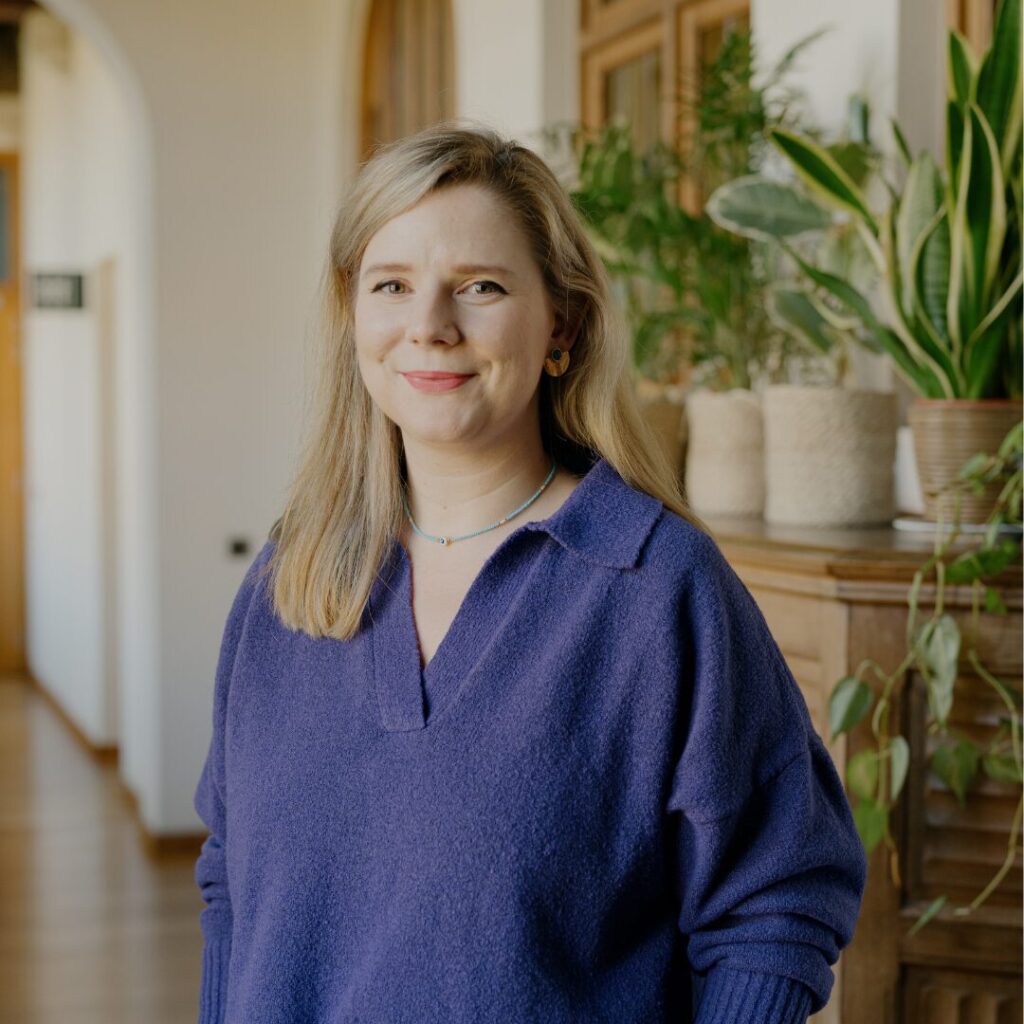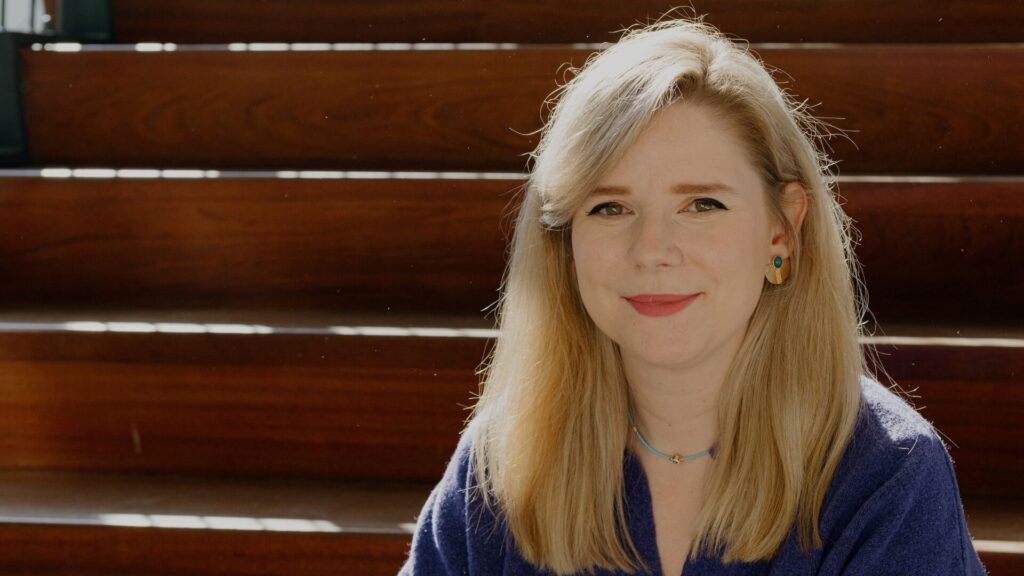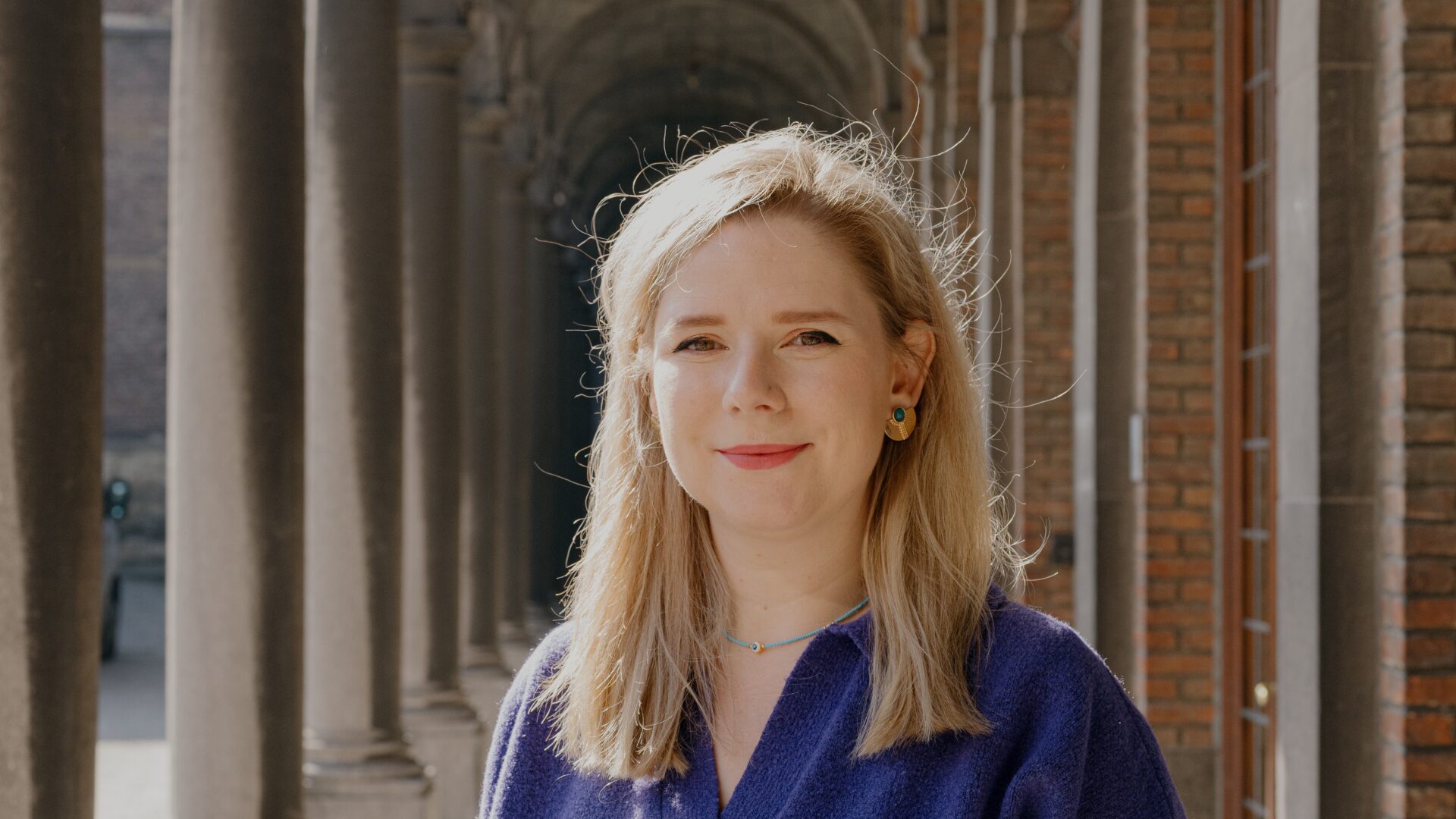Margot Bloemen had just become a mum when she got the itch to study for a master degree. Thanks to the support of her department and faculty, she manages to combine studies, work and motherhood well. ‘It’s nice to work in an organisation that encourages you to chart your own path’, says Margot.
She had already proved she can keep several balls in the air at once. While studying for her Bachelor of Linguistics and Literary Studies, she designed websites to pay for her student room. ‘Three weeks after my last exam, I was able to join a major theatre company as a press and communications manager. I decided to go for it and forgo my master degree. Later, I worked as a freelancer for two years from Turkey, where I met my current husband. A holiday that had unexpectedly turned out to be a one-way trip’, she says with a smile. ‘In 2017, we settled together in Antwerp. Two years later, I joined the Marketing and Communications Department as social media manager, a new position at the time. In 2021, our daughter Marie was born.’
Last year, you started studying again. Why this choice?
Margot explains, ‘I’d always dreamt of a master’s degree. And then I heard about a new master programme within the Faculty of Arts: Digital Text Analysis. In a nutshell, you learn how computers acquire and use language, with a focus on data analysis. I found that really interesting. And it also lined up nicely with my job as social media manager, which mainly revolves around data processing. The fact that I was a mum in the meantime didn’t make the step any easier. But I thought, it’s now or never. With only one grandchild left in the family, my parents and brothers could still easily jump in and help. And also my best friend, Ellis, Marie’s godmother, was always happy to come and look after her.’
Did you feel supported by our university in that decision?
‘For sure, the Marketing and Communications Department is a firm believer in continuous learning. Having said that, doing a master is very different to a week-long course’, she says with a laugh. ‘But we’ve talked everything through very well and they’re fully supportive. I received a lot of practical support from the Human Resources Department, which meant I could go to them with all my questions and they thought with me.’

‘I spread my studies over two years. It was no problem for the lecturers to give me the teaching material three months before the course started.’
Margot Bloemen
Combining work with a master programme: how do you manage it?
Margot explains, ‘I spread my studies over two years. It was no problem for the lecturers to give me the teaching material three months before the course started. During the first semester, I followed the lectures from home. The academic year started with a bootcamp to master the programming language Python, but I’d already done that independently over the summer. Since the second semester, I’ve been working 80 per cent, under a care-leave scheme for training. This is how I could actually take those classes live, and also because our department wasn’t so busy then. Meanwhile, I still have four more subjects to complete as well as my master dissertation. The professors give me a lot of support. I always get quick answers to my questions and have already once been allowed to hand in a task a bit later.’
And your job? Doesn’t your professional schedule clash with your study commitments?
‘It’s not too bad, thanks to my employer’s flexibility. This has already allowed me to be flexible with my office days. As long as my work doesn’t suffer and my colleagues aren’t put under extra strain, a lot is possible. My colleagues are also very supportive of what I’m doing. When I needed unexpected extra leave days when cramming for exams, they were very understanding. And I was always allowed to come and vent for a while after an exam,’ she laughs. ‘I had experienced that kind of caring before. When there was a shortage of breastfeeding rooms after I gave birth, several services sprang into action to help. And during the corona period, there was a lot of consideration for employees who had to work from home with small children.’

Meanwhile, you too have a little one running around the house.
‘That’s right. I’m not saying it’s always been easy. When you work half a day after a bad night because of your daughter, followed by three hours of classes and studying in the evening… Sometimes I thought, what have I done to myself? But I‘m lucky that my husband is also totally supportive and has flexible working hours. Beforehand, I explained to him really clearly that I would need not only moral but also a lot of practical support. We’ve sorted things at home so that I can fully focus on my studies. Every few weeks, we make a schedule and that works out well. Relaxation for myself, such as reading or watching television, I cut out completely; it doesn’t feel like a sacrifice. I find my studies so interesting that they feel a bit like a hobby.’
Are you already reaping the benefits of your study programme?
‘Yes, for example, I can now write scripts to analyse large amounts of data. Last year, as part of a study assignment, I carried out an evaluation of one of our social media tools. And I’ll probably write my thesis in connection with our department as well. A win-win situation!’
Does all this leave you wanting more?
‘Absolutely! It’s great to learn new things and put them into practice straightaway. I suspect I’ll always have that itch to learn more. In the future, for instance, I see myself picking up micro-credentials from the Nova Academy, an inter-university platform for lifelong learning. It’s nice that the university encourages you in this: you get to decide in which direction you want to develop, depending on your interests.’
Your daughter has since started in the first year of kindergarten.
‘Yes, mum and daughter going to school at the same time: that’s pretty special. During really busy periods, I sometimes felt guilty for having little time for her, but now I look at it another way. As a mother, I give her a great example: if you want something, you can achieve it, even in more difficult circumstances. Hopefully that message will inspire her one day.’
Margot’s story is a great illustration of our line of strength “Excellence emerging from a culture of quality, supported by a caring work and learning environment”. The lines of strength are guidelines on how you can shape your work. Now it’s up to you to put the mission in motion.


